Chibok girls: Could UK have done more?
- Published
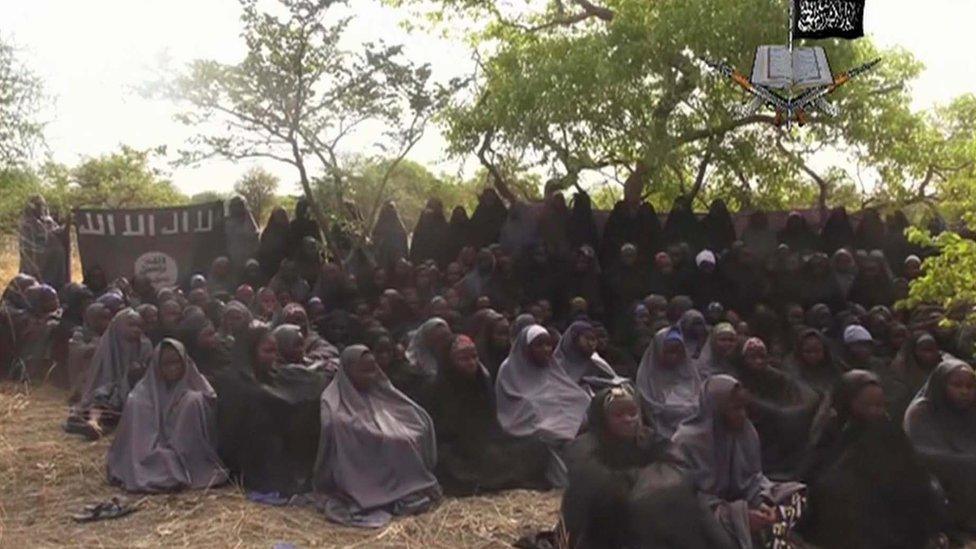
Boko Haram released an image in 2014 of some of the 270 schoolgirls abducted from Chibok in Nigeria
It seems unbelievable that two years on - apart from a few students who managed to escape soon after capture - not a single one of the 219 missing schoolgirls kidnapped from the Nigerian town of Chibok by the Islamist Boko Haram group in April 2014 has been found.
The British prime minister promised to help rescue the Chibok girls, as they had become known.
"This is an act of pure evil," David Cameron told the House of Commons.
"It has united people across the planet to stand with Nigeria to help find these children and return them to their parents."
BBC News assesses the impact of the #BringBackOurGirls campaign
But he was not speaking straight after the attack on the boarding school. Twenty-three days had gone by.
The Nigerian government in power at the time had initially denied the mass abduction had happened at all, then seemed not to care and this fuelled a local and international outcry via social media which put pressure on world leaders to act.
So what did Britain do after being pushed to make the promise to help? And was Nigeria willing to accept help?
"The UK, the French and the Americans provided surveillance and intelligence that was designed to deliver capability to the Nigerians that they did not possess," Dean Stevens, the former commander of the British Military Advisory and Training Team in Nigeria (BMATT), told me.
A team of British specialists was deployed and an RAF Sentinel spy plane joined others in the region - although initially it was delayed due to a breakdown.
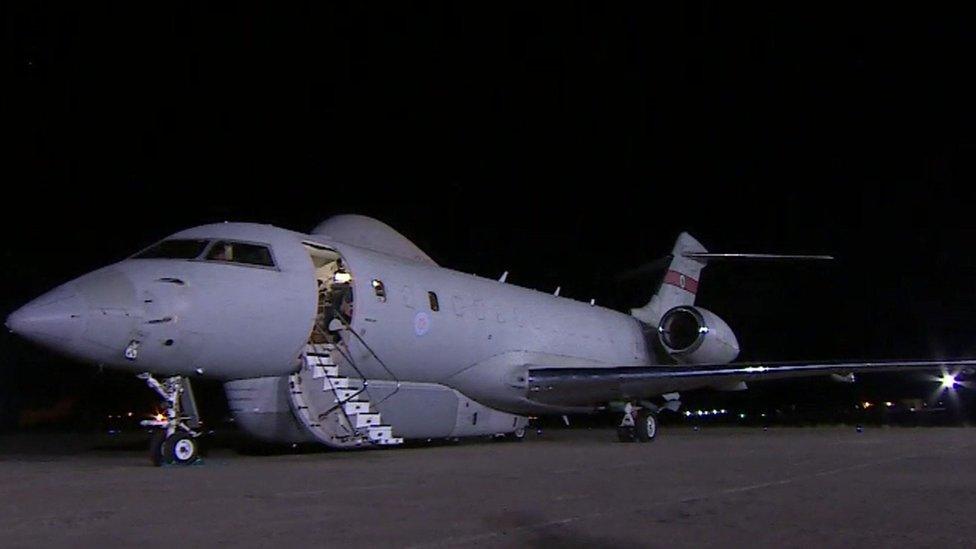
The UK sent an RAF Sentinel spy plane to search for the girls
In August officials said three unarmed RAF Tornado GR4 jets would also join the search.
They had a huge area to cover.
It was thought the Chibok girls were being held in the Sambisa Forest although there was also speculation that they had been split up and some had even been trafficked into neighbouring countries.
A few weeks later an aircraft that was part of the international effort spotted a group of around 80 people. I am told that they could have been some of the Chibok girls.
"There was only one sighting of a large group of what was assessed to be females but that was not supported by any other intelligence," said Lt Col Dean Stevens, BMATT commander between March 2013 and March 2015. He said what was required was additional intelligence from Nigerians on the ground.
"Ultimately it was the responsibility and decision of the Nigerians to react to that information and they chose not to do anything with that information they received."
Rescue mission risky
Mounting any rescue mission would have been extremely risky and the UK had history.
In 2012 British Special Forces tried to save Chris McManus and his Italian colleague Franco Lamolinara, external, who were being held by jihadists in north-west Nigeria. Both hostages were killed. Officials said the captors executed them just after the Nigerian and British troops had stormed the compound.
A year later another British construction worker Brendan Vaughan was amongst seven hostages killed by a Boko Haram splinter group, external which mistakenly thought a rescue operation was under way.
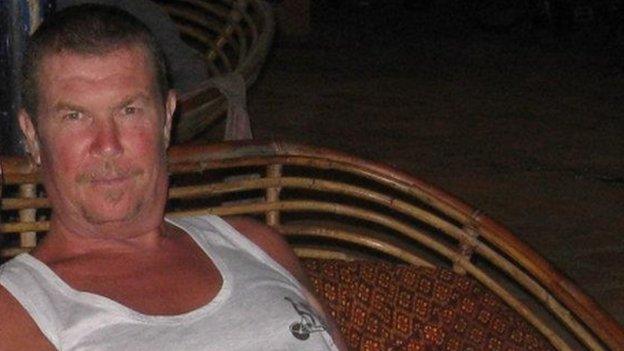
Hostage Brendan Vaughan was killed when Boko Haram thought a rescue operation was under way
"It's hard enough and we British know this from bitter experience to get a single hostage out of an incident. To try and rescue hundreds when they may be split up is hugely dangerous," says James Hall, a retired colonel and former UK military attaché to Nigeria.
"There must be a very significant danger if they are properly guarded and protected that many of them are going to be killed.
"So frankly I don't think even the best armed forces would have found this easy or would have been keen to do it unless they absolutely had to and the idea that the Nigerians could have done it is frankly ridiculous."
At the time Boko Haram jihadists were causing havoc - abducting hundreds of other largely undefended civilians, seizing territory and showing that Nigeria's military was no longer the regional force it used to be in the 1970s and 1980s.
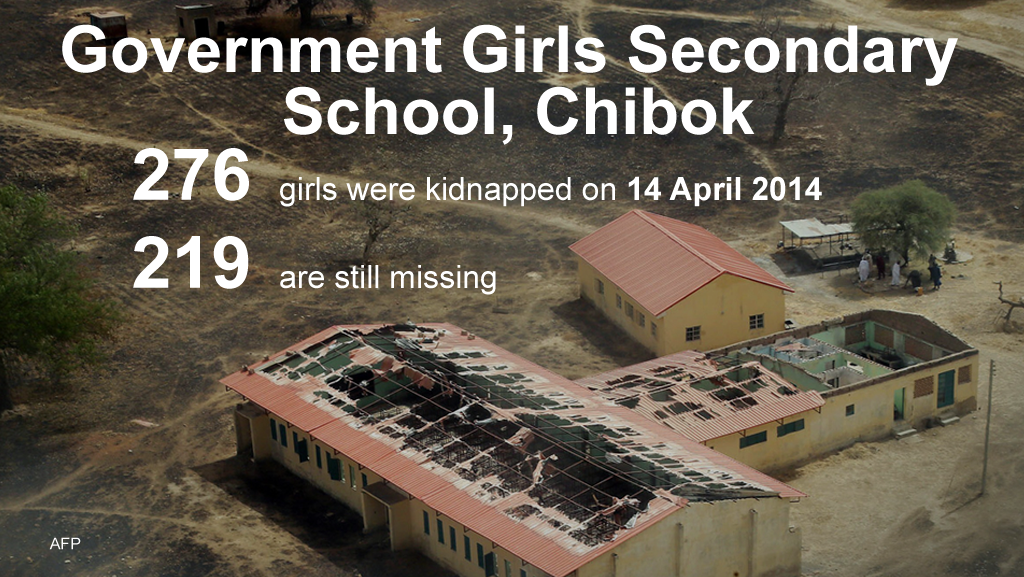
"It was painfully obvious that they were very much a spent force. Their equipment was in very bad order, their training was frankly very weak. They still have some very good people but as an international force today they are very weak," James Hall told the BBC.
Help not wanted
But could Britain and other countries have done more to help rescue the girls?
Boots on the ground were never likely given the complexities of the conflict and difficulties of working with the Nigerian army which has an extremely poor human rights record. But I am told no more help was wanted.
"As far as actually dealing with the situation in the north-east, the Nigerian military and the politicians believed that they were capable of dealing with that and so neither asked for wanted or indeed accepted any of the offers for further help," said Dean Stevens.
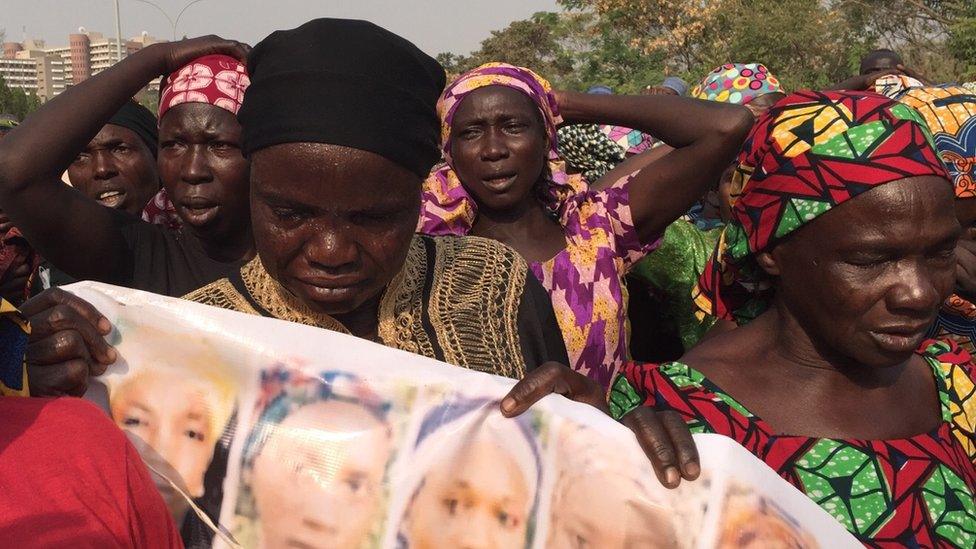
Parents of the missing girls have campaigned for more to be done
That might seem a strange position for a country that at the time was losing a war against jihadists but there were other factors at play.
It is likely that some senior Nigerian officials in the former government would not have wanted these international partners to find out too much about its military which had been severely weakened by corruption.
Some British officials may have been quietly relieved that Nigeria was not calling for more direct help in the north-east. It would have been an extremely difficult mission with enormous risk.
During their two years in captivity there have been other efforts to get several dozen of the girls released.
Stephen Davis, an Australian who had worked in the Niger Delta, got in contact with Boko Haram commanders and was on the verge of a breakthrough.
"Then as the girls were being taken to the agreed point for the handover, another Boko Haram group ambushed them and took them away," a former Nigerian official who at the time worked with the security services told me.
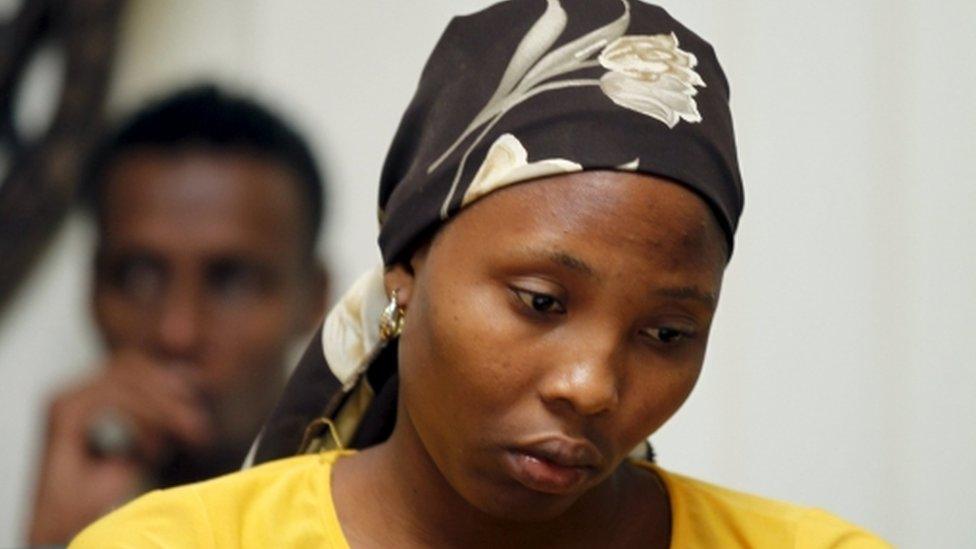
Rebecca Issac is one of the few that escaped from Boko Haram
The Nigerian military effort has improved and thousands of civilians have been rescued from areas once held by the jihadists.
"It is a mystery that not a single one of the Chibok girls has been found among them. That suggests just how much of a prize the students have been to the group," the ex-official told me.
The UK and the US have increased their training programmes in Nigeria to help build the military's capacity to deal with the country's long list of security challenges. But due to human rights concerns there is a limit to what help they are willing to give.
"Sometimes it's a matter of doing business with the devil you know because the Nigerian military are not perfect by any means whatsoever but they are significantly better people than Boko Haram," says James Hall, adding it is a dilemma that needs to be carefully looked at.

Boko Haram at a glance:

Boko Haram fighters still appear well armed in recent propaganda videos
Founded in 2002, initially focused on opposing Western-style education - Boko Haram means "Western education is forbidden" in the Hausa language
Launched military operations in 2009
Thousands killed, mostly in north-eastern Nigeria, hundreds abducted, including at least 200 schoolgirls
Joined so-called Islamic State, now calls itself IS's "West African province"
Seized large area in north-east, where it declared caliphate
Regional force has retaken most territory last year
